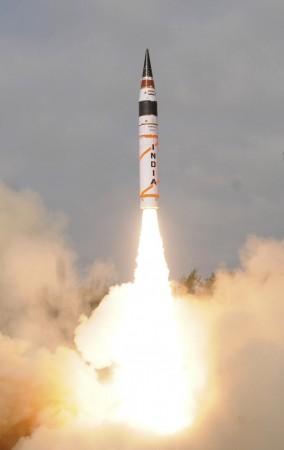
There has been a decline in the number of nuclear warheads in the world, but the nine countries possessing nuclear weapons are not keen on giving up their nuclear arsenal anytime soon, according to the recently released data on the world's nuclear forces by the Stockholm International Peace Research Institute. Further, India falls behind its neighbor Pakistan in nuclear weapons possession.
The organization released its annual nuclear forces data on Monday, according to which, till January 2014, India had a total of 90 to 110 warheads, a little lower than Pakistan's 100-120 warheads. The United States of America and Russia still dominate with more than 90 percent of the nuclear weapons possession in the world, with USA reported to have 7,300 warheads, lower than Russia's 8000.
China has 250 nuclear warheads, as per the report.
SIPRI researchers cited that none of the countries were on the path of nuclear disarmament. "'Once again this year, the nuclear weapon-possessing states took little action to indicate a genuine willingness to work toward complete dismantlement of their nuclear arsenals," researchers Shannon Kile and Philip Schell explained.
Their concerns is reflected in the fact that in the last four years, from 2010 to 2014, many states, including India, China and Pakistan, have increased their nuclear armament. While India had 60-80 warheads in 2010, it now has close to 110.
However, the United Kingdom and France did not increase their arsenal; and Russia and the United States have reduced their inventories, under the Treaty on Measures for the Further Reduction and Limitation of Strategic Offensive Arms (New START), according to the report.
Thus, overall, there are 16,300 warheads in the world in 2014, compared to 17,270 in 2013 and 19,000 in 2012.
The Stockholm report suggested that all the nine countries are modernizing their nuclear arsenals and delivery systems.
However, though India has increased its nuclear weapon inventories, the concern is about the necessary delivery systems, as highlighted by The Times of India.
The Indian Armed Forces still do not possess the crucial submarine-launched ballistic missiles (SLBMs) and the inter-continental ballistic missiles (ICBMs), the report stated. While the nation has successfully tested its first ICBM Agni V, which has a range of 5,000 kilometres, it will become fully operational only three years down the line.
"We have a declared no-first use (NFU) nuclear policy, which requires effective and survivable second-strike capabilities for massive retaliation in case of a first strike. This can only come through nuclear-powered submarines armed with SLBMs, hidden deep underwater for extended periods of time," the TOI report quoted an official.
The report also stated that Pakistan is also still to acquire ICBMs and SLBMs.
The United States, Russia, China, France and the United Kingdom are the only five countries that are legally recognized as nuclear weapons-possessing states, while India, Pakistan, Israel and North Korea are not signatories to the nuclear non-proliferation treaty.









